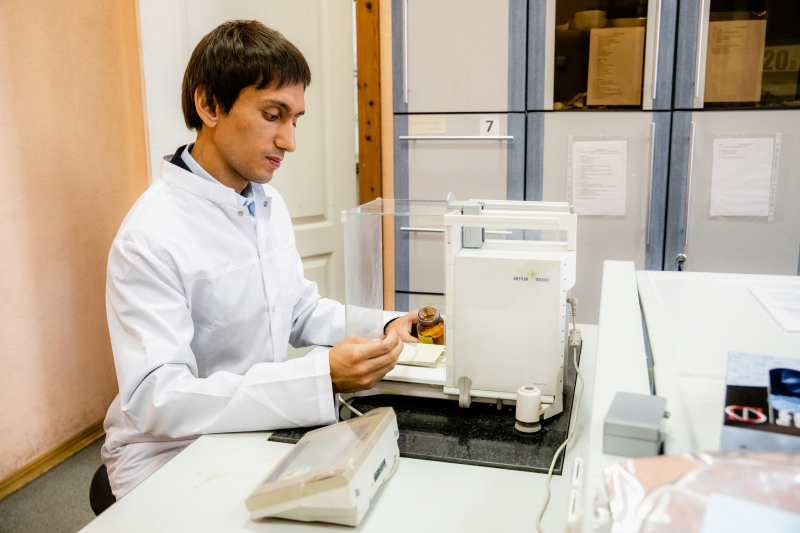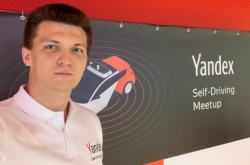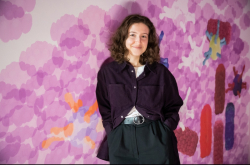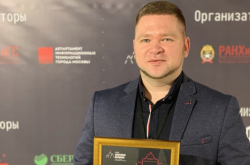Being one of the most advanced and multidisciplinary fields in modern-day production, bioengineering and smart materials requires competencies in a wide range of sciences.
ITMO offers various specializations within its Bioengineering and Biotechnical Systems program. So, for instance, the students of Bioengineering and Biomaterials study computer modeling, bioinformatics, genetic analysis, and structural biology. In the future, graduates can use these competencies to create next-gen pharmaceutical products and smart materials. The Biotechnical Systems specialization blends the fundamentals of information and management systems, microcircuitry, computer-aided metrology, and automation. And students of the Multi Sensory Systems specialization develop rapid diagnostic devices for medical, chemical, and environmental applications.
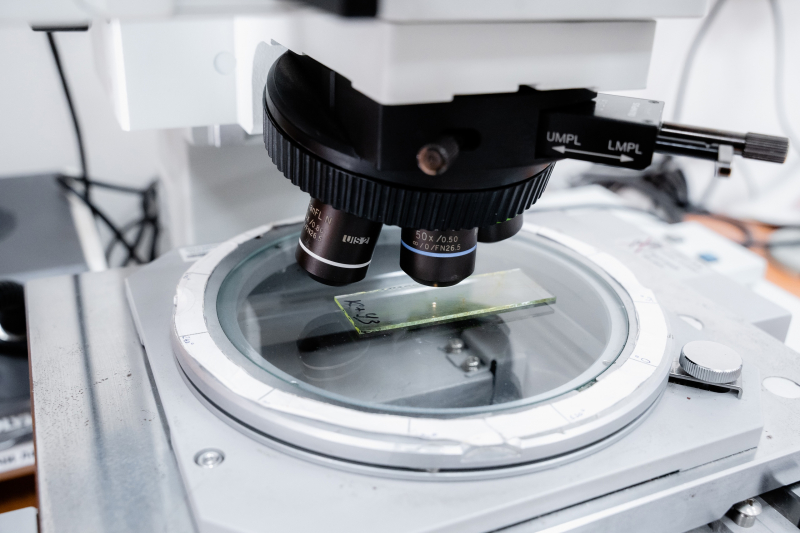
ITMO’s International Scientific and Research Institute of Bioengineering
Two other specializations, Molecular Nano- and Biophotonics and Organic Material for Photonics, are implemented in collaboration with École Normale Supérieure de Cachan (ENS Cachan), France, and New Mexico Highlands University, the US, respectively. These programs train future world-class specialists in the highly innovative domain of molecular photonics for telecommunications and biology, and the development and application of new materials and photonic components based on polymers and nanocomposites.
Graduates work at major tech companies in Russia and abroad, including BIOCAD, Gazprom Neft, Lengazspetsstroy, Lengiprotrans, EuroChem, Analytica, and many others.
ITMO.NEWS talked to some of this year’s graduates to learn more about their experience.
Tatiana Machel
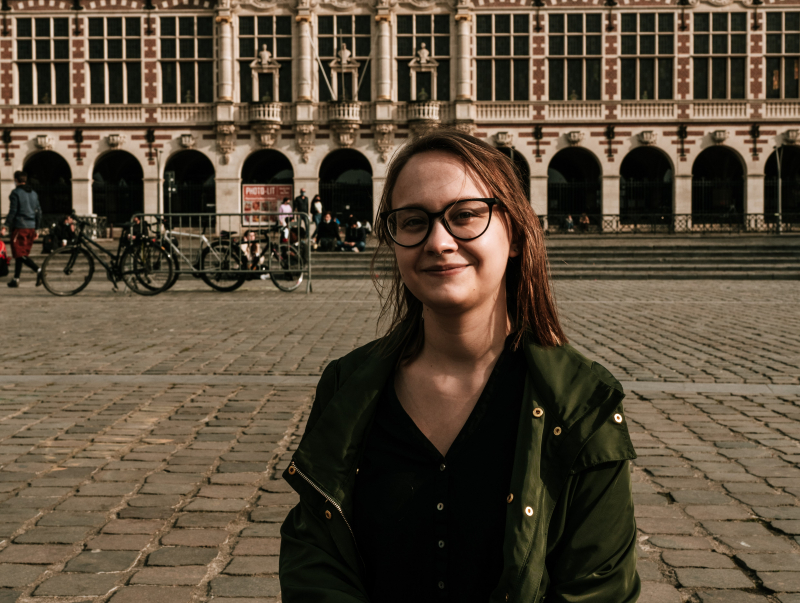
Tatiana Machel. Photo courtesy of the subject
I wrote my thesis on the synthesis and study of quaternary ammonium polymers for their use as biocompatible components of bioactive substance (BAS) delivery systems. I also participated in a project on the development of new biopolymers and their further testing on mammalian cells. We were particularly interested in the creation of more efficient gene-delivery systems.
For two years, I combined my studies and lab work. We had a rather convenient schedule, so there was no need for me to do too many things at once. I even got to do a six-month internship at the laboratory of Vrije Universiteit Brussel. There, I helped to create an mRNA-based vaccine against HIV, which would potentially be delivered using the polymers that we developed.
ITMO offers multiple opportunities for applicants. For example, prospective students can participate in a portfolio contest and enroll in one of its many programs without having to take any exams. Thanks to this, I could apply even before my graduation and get the results in late June.
I wanted to further explore biotechnology, so I had no problem picking a specialization. Among all programs, I chose Bioengineering and Biotechnical Systems. It offers a rather exciting curriculum, as well as opportunities to study abroad.
In my first semester at ITMO, I got the chance to attend a lecture delivered by Angela Belcher, a professor at MIT, which was followed by dinner. It’s one of my most vivid memories but, of course, I will always remember the course on the internationalization of research and my internship in Belgium, too.
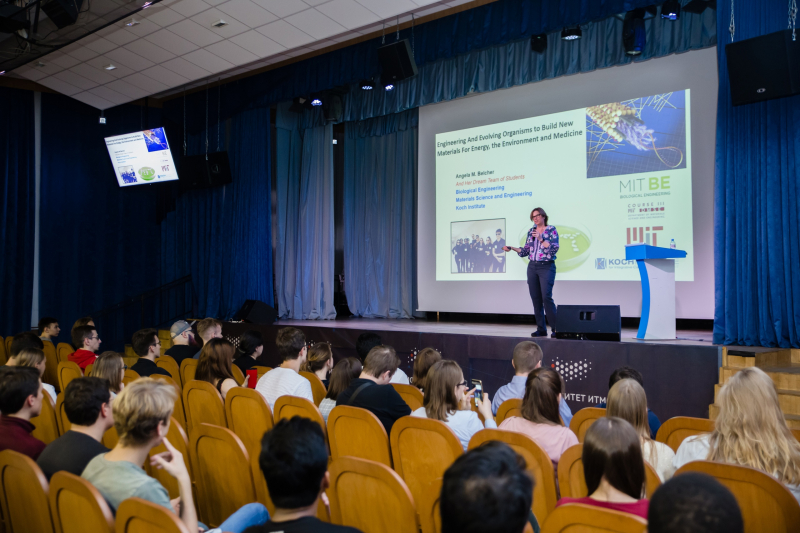
Angela Belcher delivers an open lecture at ITMO University
I managed to achieve even more than I could imagine when applying to the university. I won several scholarships, studied abroad, and also met lots of people in my field. Studying wasn’t hard, even though I got stressed during exams. But they went smoothly; we always had all the study materials we needed, and could talk to lecturers, if we had any questions.
As soon as I got in, I managed to get a job at BIOCAD. Now, I am involved in the development of protein drugs.
Alina Voronova

Alina Voronova. Photo courtesy of the subject
My thesis focused on the development of cross-linked hyaluronic acid (HA)-based antibacterial coatings for medical implants. All in all, I’ve worked on this project for my entire university life. I studied various coating compositions, conducted experiments, and analyzed outcomes.
When choosing a university, I was determined to study in St. Petersburg. I love this city! And then, I came across ITMO, one of the top Russian universities, and fell in love again.
At first, I studied a bit of a different field. In my third year, I got interested in lab work, bioengineering, and biopolymers. So, I knew right away what I wanted to do for my Master’s.
I enjoyed my studies. It fully met all my expectations. We had both specialized disciplines and soft skills classes. That is, we could not only explore machine learning and project management but also listen to the stories of entrepreneurs. During such classes, people who either started their own business or held a senior position at a major company shared their experience and advice.
The program offers subjects in a wide range of fields: from mathematical simulation of physical processes to molecular switches in biology. Thanks to this, students can explore various processes from different perspectives and understand them better.
At the moment, I am working in polymer production.
Artur Sauts
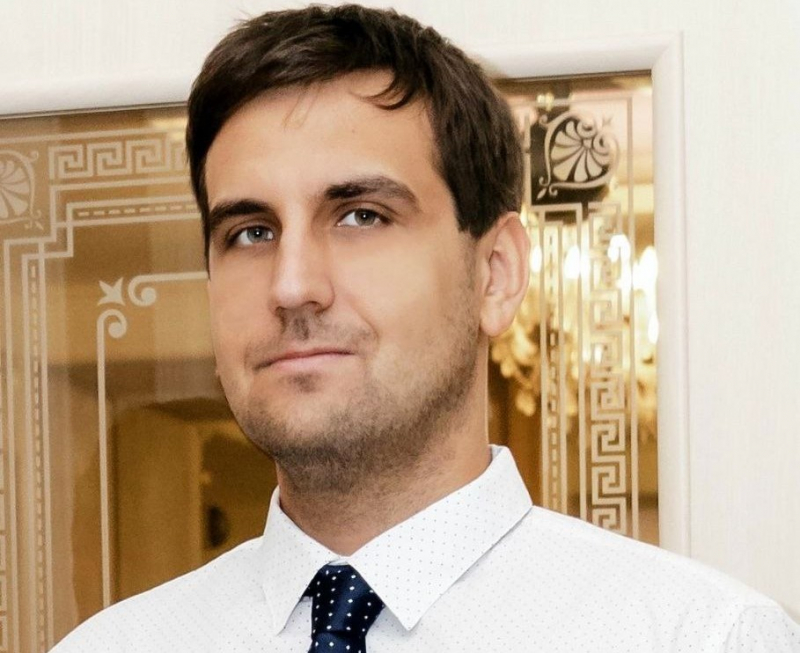
Artur Sauts. Photo courtesy of the subject
My work has to do with using methods of structural bioinformatics to study the toxicity of 2-dimethylaminoethylazide and its derivatives. With the help of computer simulation, I was able to preliminarily assess the toxicity of newly synthesized substances and even carry out their hygienic standardization. My research can help drastically reduce animal testing, as well as save time and money.
I originally wanted to do pediatrics for my Master’s, then I thought about studying biology at St. Petersburg State University. However, I couldn’t figure out how to apply there via a portfolio competition and didn’t really want to ruin my vacation and go to St. Petersburg at that time. Then, I stumbled upon ITMO that also offered such an amazing opportunity for applicants. And that’s how I got in.
Initially, I wanted to focus on the use of bioinformatics for diagnosing diseases caused by mutations, such as cancer or Alzheimer's disease. I found a supervisor but as it turned out, his research interests were chemoinformatics, molecular modeling, and drug design. So, I decided to change my topic.
Because of the pandemic, I couldn’t do internships and spent most of my time at the bioinformatics laboratory. Most of all I enjoyed the course on nanomaterials and my participation in the Congress of Young Scientists.
Now, I got the position of an associate professor at the St. Petersburg State Chemical Pharmaceutical University and plan to continue my research in computer modeling and the development of new drugs for socially significant diseases.
